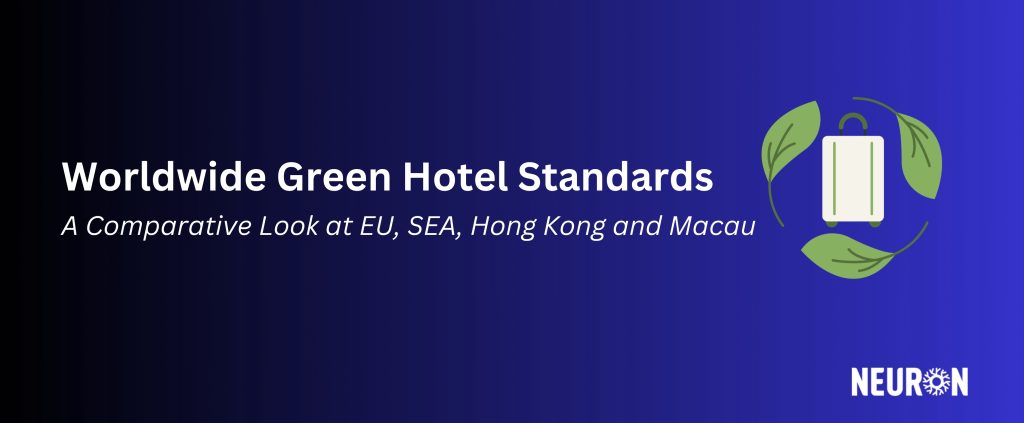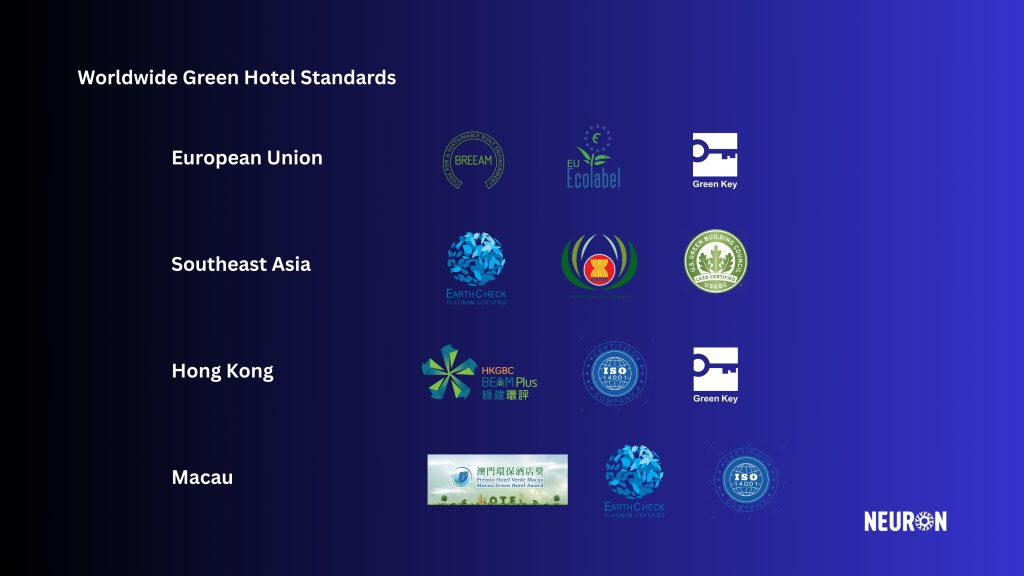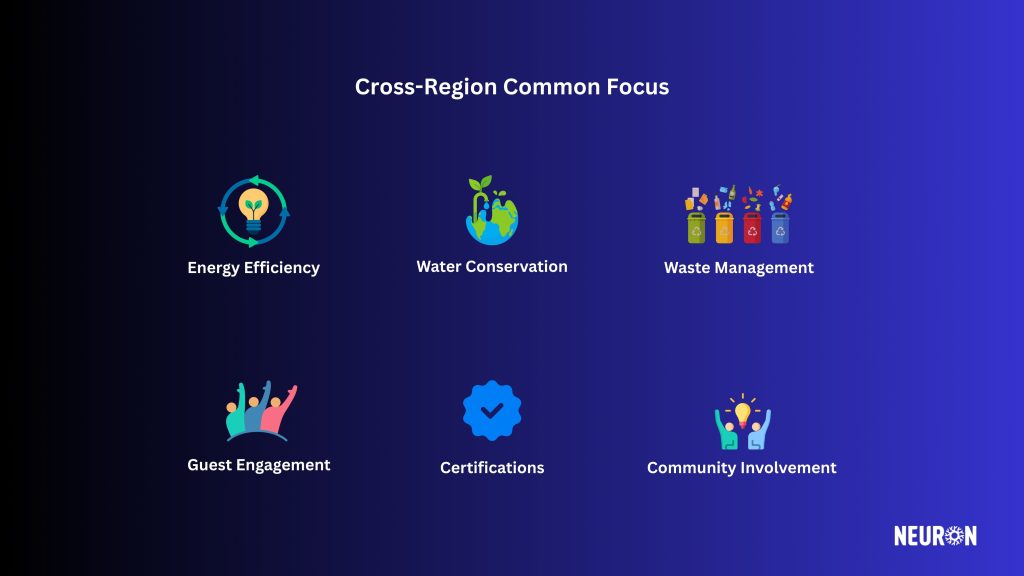
Green hotels—those that implement eco-friendly practices to reduce their environmental footprint—are becoming a standard, not just a trend. Across the globe, regions like the European Union (EU), Southeast Asia (SEA), Hong Kong (HK), and Macau are setting benchmarks for sustainable hospitality through various green hotel standards.
In this blog, we explore the similarities between the green hotel standards in these regions, their unique approaches, and how these frameworks are shaping the future of eco-friendly tourism.
What Are Green Hotel Standards?
Green hotel standards are certifications, guidelines, or criteria that hotels follow to operate sustainably. These standards focus on reducing carbon emissions, conserving energy and water, minimizing waste, and improving the well-being of guests and employees.
Certifications like LEED (Leadership in Energy and Environmental Design), Green Key, and EarthCheck are widely recognized globally, but individual regions also have their unique frameworks tailored to local environmental and cultural contexts.

Green Hotel Standards in the European Union (EU)
The EU has been a pioneer in promoting sustainable practices across various industries, including hospitality. Green hotel standards in the EU are largely aligned with the region’s broader environmental policies, such as the European Green Deal and Fit for 55 targets aimed at achieving net-zero emissions by 2050.
Key Green Hotel Standards in the EU:
- EU Ecolabel:
- A certification that recognizes hotels committed to reducing their environmental impact through energy efficiency, waste management, and water conservation.
- It focuses on transparency and compliance with EU environmental laws.
- Green Key:
- A globally recognized eco-label awarded to hotels that meet high environmental standards, including renewable energy use and guest education on sustainability.
- Widely adopted by boutique and luxury hotels in Europe.
- BREEAM (Building Research Establishment Environmental Assessment Method):
- Though originally a building standard, BREEAM is increasingly used to assess hotels’ environmental performance during construction and operation.
- Focuses on energy efficiency, water use, and sustainable design.
Key Focus Areas in the EU:
- Energy Efficiency: Transitioning to renewable energy sources like solar and wind.
- Waste Reduction: Emphasis on circular economy practices, including recycling and composting.
- Water Conservation: Technologies like low-flow fixtures and rainwater harvesting systems.
- Guest Participation: Encouraging eco-friendly behavior among guests, such as reusing towels or reducing single-use plastics.
Green Hotel Standards in Southeast Asia (SEA)
Southeast Asia, a region known for its natural beauty, is recognizing the importance of sustainable tourism to protect its ecosystems. While SEA countries vary in terms of regulations and development, green tourism is gaining momentum, with governments and private stakeholders promoting eco-friendly practices.
Key Green Hotel Standards in SEA:
- EarthCheck:
- A certification widely used in SEA, focusing on carbon neutrality, energy efficiency, and community engagement.
- Hotels in countries like Thailand, Indonesia, and the Philippines frequently adopt EarthCheck certification.
- ASEAN Green Hotel Standard:
- A regional initiative aimed at promoting sustainability in the tourism sector across ASEAN member countries.
- It focuses on energy conservation, waste management, and the use of local products to support communities.
- LEED Certification:
- Although global, LEED-certified hotels are increasingly popular in SEA, particularly in urban centers like Singapore and Bangkok.
Key Focus Areas in SEA:
- Community Engagement: Supporting local artisans and businesses to promote sustainable tourism.
- Plastic Reduction: A major focus in countries like Thailand and Indonesia to combat plastic pollution in oceans.
- Biodiversity Protection: Hotels are adopting sustainable landscaping practices to preserve local flora and fauna.
- Renewable Energy: Solar energy and biomass are emerging as key energy sources for green hotels.
Green Hotel Standards in Hong Kong (HK)
Hong Kong, a global financial hub, is also a leader in sustainable urban development. Given its dense population and high tourism rates, green hotel standards in Hong Kong focus on maximizing efficiency in limited spaces while aligning with the city’s environmental goals.
Key Green Hotel Standards in HK:
- BEAM Plus (Building Environmental Assessment Method Plus):
- Hong Kong’s homegrown green building standard, which evaluates energy use, water efficiency, indoor environmental quality, and waste management.
- Many hotels in Hong Kong have adopted BEAM Plus to enhance their sustainability credentials.
- Green Key:
- Similar to its adoption in the EU, Green Key is widely recognized in Hong Kong for promoting eco-friendly hotel practices.
- ISO 14001:
- An international environmental management standard that many Hong Kong hotels follow to demonstrate their commitment to sustainability.
Key Focus Areas in HK:
- Energy Efficiency in Urban Settings: Hotels are leveraging smart building technology to reduce energy consumption.
- Waste Management: With limited landfill space, waste reduction and recycling are prioritized.
- Water Conservation: Water-saving fixtures and greywater recycling systems are common in green hotels.
- Guest Education: Hotels actively involve guests in green practices, such as reducing water use and minimizing food waste.
Green Hotel Standards in Macau
Macau, a vibrant tourism and entertainment hub in Asia, is increasingly embracing sustainable practices in its hospitality sector. Known for its world-class integrated resorts and rich cultural heritage, Macau recognizes the importance of sustainable tourism to preserve its environment and enhance its global reputation.
Key Green Hotel Standards in Macau
- Macau Green Hotel Award:
A local initiative by the Macao Government Tourism Office (MGTO) to promote eco-friendly practices in the hospitality sector. Hotels are evaluated on energy efficiency, waste management, water conservation, and environmental awareness. - ISO 14001 Certification:
Many hotels in Macau follow ISO 14001, an internationally recognized environmental management system, to demonstrate their sustainability commitment. - EarthCheck Certification:
Several of Macau’s large-scale integrated resorts have adopted EarthCheck, a global standard for sustainability, focusing on energy use, water conservation, and community engagement.
Key Focus Areas in Macau
- Energy Efficiency in Mega Resorts:
Large integrated resorts in Macau are adopting energy-efficient technologies like LED lighting, smart HVAC systems, and renewable energy solutions to reduce their carbon footprint. - Water Conservation:
Many hotels utilize water-saving fixtures, greywater recycling systems, and rainwater harvesting to reduce water consumption. - Waste Management:
With limited landfill space, Macau prioritizes waste reduction, recycling, and composting. Hotels are also working to reduce single-use plastics and implement food waste recycling initiatives. - Local Community Engagement:
Hotels in Macau increasingly support sustainable tourism by sourcing locally made products, collaborating with local artisans, and promoting cultural heritage experiences for guests. - Green Building Design:
New hotel developments in Macau feature eco-friendly designs that minimize energy use and incorporate green spaces, aligning with global trends in sustainable architecture.

Similarities Across Green Hotel Standards in EU, SEA, HK, and Macau
Despite regional differences, green hotel standards across the EU, SEA, Hong Kong, and Macau share several commonalities:
- Energy Efficiency: Transitioning to renewable energy sources and improving energy management systems.
- Water Conservation: Installing low-flow fixtures, rainwater harvesting systems, and greywater recycling.
- Waste Management: Reducing single-use plastics, promoting recycling, and adopting circular economy principles.
- Guest Engagement: Educating guests about sustainability practices and encouraging participation in eco-friendly initiatives.
- Certifications: Adoption of globally recognized frameworks like Green Key, EarthCheck, and ISO 14001.
- Community Involvement: Supporting local communities through sustainable sourcing and employment.
The Future of Green Hotels
As travelers increasingly seek eco-friendly accommodations, green hotels will continue to grow in popularity. Regions like the EU, SEA, Hong Kong, and Macau are leading the charge by adopting stringent green hotel standards that prioritize sustainability while enhancing the guest experience.
At Neuron, we’re committed to supporting the implementation of smart, sustainable solutions for the hospitality industry. From energy-efficient technologies to IoT-enabled systems, we help hotels meet green certification requirements and create a positive environmental impact.
Ready to take your hotel to the next level of sustainability? Contact Neuron today to learn how we can help you achieve your green goals.